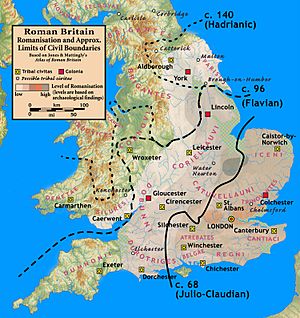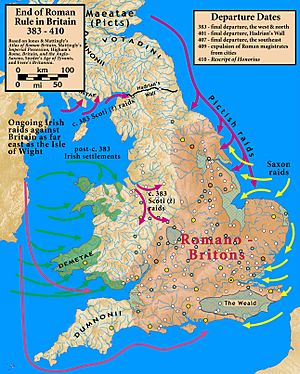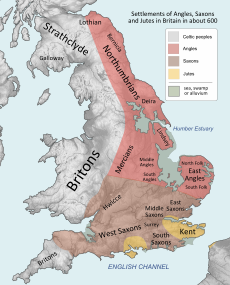British Latin facts for kids
Quick facts for kids British Latin |
|
|---|---|
| Region | Roman Britain, Anglo-Saxon England |
| Extinct | Early Middle Ages |
| Language family |
Indo-European
|
| Linguist List | lat-bri |
British Latin was a type of Vulgar Latin spoken in Great Britain during the Roman and post-Roman times. Vulgar Latin was the everyday spoken Latin, different from the formal Latin used in books.
When Britain was part of the Roman Empire, Latin became the main language for important people and in cities, especially in the south and east. But in the north and west, it didn't really replace the Brittonic language spoken by the native Britons. Experts today discuss how different British Latin was from the Latin spoken in other parts of Europe, which later turned into languages like French and Spanish.
After the Romans left Britain, Latin stopped being spoken daily in most of what is now England. This happened because of the Anglo-Saxons arriving in the 400s and 500s. Latin lasted longer in the Celtic areas of western Britain, but it also died out there by about 700 AD. It was replaced by local Brittonic languages.
Contents
How Latin Came to Britain
When the Romans first arrived in Britain in 43 AD, the native Britons spoke a Celtic language called Common Brittonic. Roman rule in Britain lasted for almost 400 years, until the early 400s. For most of this time, it covered what is now England and Wales, up to Hadrian’s Wall. Sometimes, it also included areas further north.
Historians often divide Roman Britain into two parts: a "highland zone" in the north and west, and a "lowland zone" in the south and east. The lowland zone was more influenced by Roman culture. In this area, Latin became the language of most townspeople, government officials, the army, and later, the church.
However, Brittonic remained the language of most farmers and villagers. Wealthy people in the countryside probably spoke both languages. In the highland zone, the Romans didn't try to change things as much, so Brittonic always stayed the main language there.
Across much of western Europe, the everyday Latin (Vulgar Latin) slowly changed into different local languages, which are now called Romance languages. But in Britain, after the Romans left in the early 400s, Vulgar Latin stopped being spoken daily. When and how it disappeared in Britain has been a big topic of discussion for scholars.
How We Know About British Latin
It's hard to study Vulgar Latin because it was a spoken language that no longer exists. We can't find direct records of it. Instead, we rely on indirect clues. These clues include "mistakes" in old written texts and words carved into stone. These "mistakes" often show how people actually spoke.
Especially helpful are personal writings by ordinary people, like words on tombstones, gifts to gods, and "curse tablets". Curse tablets were small metal sheets used to wish bad luck on someone.
In the 1950s, a scholar named Kenneth H. Jackson studied Latin words that had entered the British Celtic languages. He used these words to understand what British Latin was like. Later, in the 1970s and 1980s, other scholars like John Mann and Colin Smith looked at everyday writings on stone to learn more about spoken British Latin.
Many new Latin writings have been found in Britain recently. Some of the most famous are the Vindolanda tablets, which are wooden writing tablets found near Hadrian's Wall. The Bath curse tablets are another important discovery. These findings have given us a lot more information about how Latin was spoken in Britain.
Was British Latin Different?
Kenneth Jackson believed that British Vulgar Latin was different from the Latin spoken on the European continent. He thought there were two types of British Latin: a common one, similar to continental Latin, and a special upper-class one. He said this upper-class Latin was very old-fashioned in its sounds compared to other Latin.
More recent studies have changed some of Jackson's ideas. While British Vulgar Latin was probably not hugely different from the Latin in France (Gaul), it likely developed some unique features over 400 years of Roman rule. The influence of the native Brittonic language also probably made it distinct. However, even with many new discoveries, it's still hard to find clear proof that it was a completely separate dialect.
When Latin Disappeared in Britain
We don't know exactly when Vulgar Latin stopped being spoken in Britain. But it was probably still widely spoken in some parts of Britain into the 400s. In the lowland zone, Old English replaced Vulgar Latin during the 400s and 500s. But in the highland zone, it was replaced by Brittonic languages like Primitive Welsh and Cornish. When exactly it died out is "one of the most puzzling problems" for historians.
Lowland Zone
In most of what became England, the Anglo-Saxons arrived and brought Old English with them. This seems to have caused Vulgar Latin to disappear as a spoken language. The Anglo-Saxons moved west across Britain from the 400s to the 600s. They left only Cornwall and Wales in the south, and the Hen Ogledd (Old North) in the north, under British rule.
The way Latin disappeared in Britain is different from other parts of Western Europe. In places like France, Italy, and Spain, where Germanic groups also moved in, Latin and the Romance languages continued to be spoken. One idea is that in Britain, Roman ways of life and important buildings fell apart more completely. This made the Roman culture less important. So, the native people might have been more likely to switch to the Anglo-Saxons' language, which became more important.
Another idea, supported by Richard Coates, is that many Anglo-Saxon settlers replaced the people in southern and eastern England. He believes this is the best explanation for why Latin (and Brittonic) disappeared in the lowland zone. He bases this on place names and the lack of Latin words with a "Brittonic accent" in English.

From the 400s onwards, there are only a few hints that spoken Latin continued. These hints are mostly from the Church or educated people. Some scholars, like Alaric Hall, have even wondered if the historian Bede's writings from the 700s might suggest that spoken British Latin survived in some form until his time.
Highland Zone
Before Roman rule ended, Brittonic was still the main language in the highland zone. However, in the 400s, more people speaking Vulgar Latin moved into this area. These were Romano-Britons fleeing the Anglo-Saxons from the lowland zone. These newcomers were often from the upper classes. Vulgar Latin kept a higher social status than Brittonic in the highland zone during the 500s.
Even though many British leaders in western Britain continued to speak Latin, it died out by about 700 AD. The Latin-speakers who arrived from the lowland zone seemed to quickly blend in with the existing population and started speaking Brittonic. The loss of the lowland areas to the Anglo-Saxons might have also hurt British Latin. This indirectly meant that Vulgar Latin wouldn't survive in the highland zone either.
See also
- Anglo-Latin literature
- Anglo-Norman language
- Hermeneutic style
- Brithenig – a made-up language that imagines if British Latin had replaced Celtic languages
 | Aaron Henry |
 | T. R. M. Howard |
 | Jesse Jackson |




